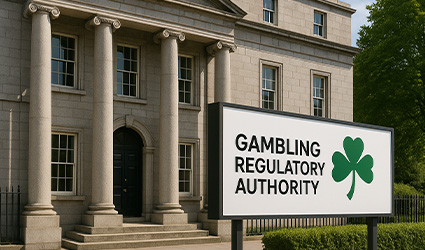Ireland’s newly established gambling regulator has begun its work, but it could be over a year before the industry sees any real enforcement of new gambling laws. While the Gambling Regulatory Authority of Ireland (GRAI) was officially formed in March 2025, the practical rollout of licensing and regulatory measures appears to be staggered, with varying interpretations of the timeline creating confusion over when full compliance will be required.
In response to a parliamentary query from Labour TD Mark Wall, Justice Minister Jim O’Callaghan stated that the comprehensive licensing regime under the Gambling Regulation Act 2024 wouldn’t be in effect until mid-2026. This delay directly impacts the launch of the Social Impact Fund — a resource earmarked to support gambling harm prevention, education, treatment, and research, funded by contributions from licensees based on their annual turnover.
“People who are dealing with gambling addiction desperately need the Social Impact Fund operational as soon as possible,” Wall told The Journal, emphasizing the urgency of establishing support systems. He highlighted recent studies revealing that over 20% of 16-year-olds in Ireland, predominantly male, had engaged in gambling over the past year. “This is not just a statistic; it’s a reflection of the real and growing crisis affecting our youth,” he added.
GRAI Aims for Earlier Licensing Start Despite Political Comments
However, the GRAI offered a more optimistic outlook, contesting the idea of a significant delay. The authority confirmed it is aiming to begin accepting licensing applications by the end of 2025, emphasizing a phased approach that would see different segments of the gambling industry onboarded incrementally.
“As outlined in the Gambling Regulation Act, obligations that will be regulated by the GRAI are applied to licensees. Therefore, in order for the GRAI to be a fully functioning regulator, our priority is to commence licensing as soon as possible,” the agency said. They noted that success will depend on a smooth transition from the current licensing system, which is fragmented and outdated.
This phased model could allow certain operators — for example, online platforms or physical betting shops — to begin the application process before others, enabling the regulator to gradually implement new compliance frameworks without overwhelming its operational capacity.
The appointment of GRAI’s leadership in March was seen as a critical milestone. Justice Minister O’Callaghan named Paul Quinn, a senior civil servant, as chair of the authority. By the end of 2025, the GRAI is expected to employ 35 staff members, with numbers projected to grow further through 2026 and 2027 as the authority scales up its oversight responsibilities.
International Collaboration Begins as GRAI Builds Foundation
Alongside its domestic work, the GRAI is also laying the groundwork for international cooperation. The agency recently signed a Memorandum of Understanding (MoU) with the Belgian Gaming Commission, signaling the beginning of broader efforts to collaborate with EU counterparts. The agreement, signed by GRAI CEO Anne Marie Caulfield and Belgian regulator Magali Clavie, focuses on information sharing and joint strategies to better manage cross-border regulatory challenges.
“The shared aims of both regulators are to enable closer working relationships which will enhance each organization’s ability to discharge their respective duties and functions,” the GRAI said in a statement. The Belgian authority has provided crucial advisory support during GRAI’s initial setup phase, and further MoUs with other European regulators are expected in the coming months.
What’s in the New Regulation Act?
Once fully operational, the Gambling Regulation Act 2024 will introduce sweeping changes aimed at protecting vulnerable groups and tightening control over industry practices. Key measures include:
- A prohibition on free bets or similar promotional incentives.
- A ban on the use of credit cards for gambling account deposits.
- Mandatory identity verification via photo ID.
- A legal prohibition against creating gambling accounts for individuals under 18.
Despite the law’s passage last year, the only part currently in effect is the establishment of the GRAI itself. This means that for now, operators remain under no obligation to make changes, even as public and political expectations for reform continue to build.
While the GRAI insists it is on course to begin licensing by late 2025, the lack of clarity on when full legal obligations will kick in leaves many stakeholders — including those affected by gambling harms — in a frustrating holding pattern. Whether mid-2026 marks the true beginning of a regulated era, or whether incremental steps before then will start to shape the industry, remains to be seen.


